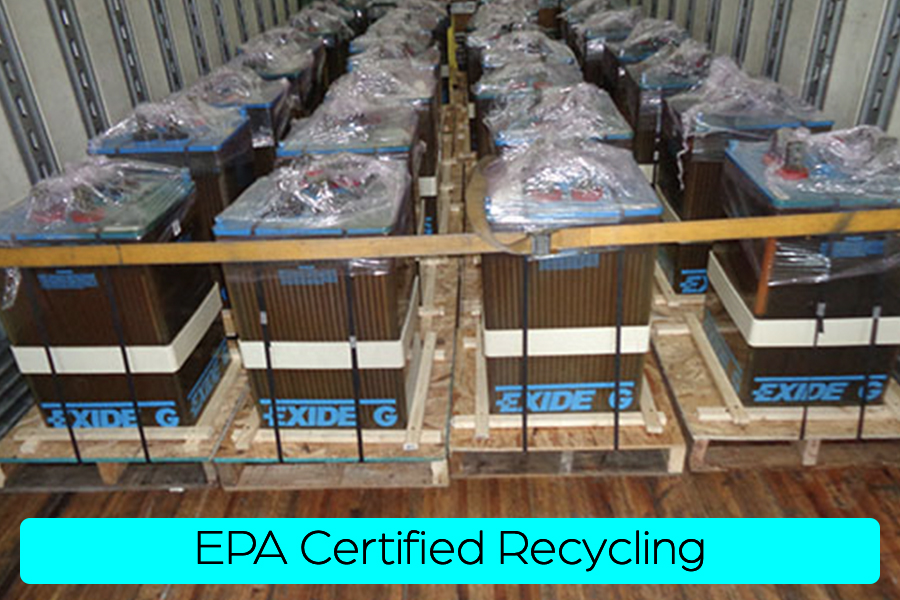
| Battery Recycling 101 |
| Welcome to Battery Recycling 101! Today’s energy landscape is constantly evolving and battery use is at the forefront of power generation. Batteries are everywhere. Automobiles use batteries as a backup for combustion engines and are emerging as the main power plant as well. Data centers are using APC modules, cell towers have huge battery backups and they all need recycling at the end of their useful lives. Within this framework are Lead and Lithium batteries. At MooreU Battery Recycling, we handle all your battery recycling needs from pickup to processing. Within 15 days of pickup, you will have your EPA certificate of proper disposal. In addition, you will be paid any money due for your batteries within 20 days of pickup. Since 2006, Our relationship with Ecobat ensures timely and responsible handling of all your spent batteries. Ecobat has locations for Lead recycling in New York, Indianapolis and California as well as Lithium Recycling in Arizona. Overview of Battery Recycling 101 Lithium-ion Battery Recycling Process: The recycling of lithium-ion batteries usually involves several steps, including collection, evaluation, repair or reuse, shredding, and further processing of recovered metals.Collection and EvaluationThe first step involves collecting batteries from data centers and evaluating them for repair or reuse. This may include identifying and sorting batteries for proper recycling.Repair or ReuseSome battery packs or modules may be evaluated for repair or reuse, either being put back into a device similar to their original one or repurposed in a different type of product or application. Recycling Techniques: The two main methods for recovering metals out of black mass are smelting (heat-based process) and leaching (liquid-based process).Responsible RecyclingIt’s important to choose a responsible recycler that operates under recycling standards set by accredited organizations like SERI’s R2 Standard or the e-Stewards standard.Benefits of RecyclingSafe recycling of lithium-ion batteries at the end of their lives conserves critical minerals and other valuable materials used in batteries, providing a more sustainable approach than disposal. Lead Battery Recycling: Lead-acid batteries are used in vehicles, uninterruptible power supplies, and various industrial applications. Recycling lead batteries is important for environmental and economic reasons, as lead is a toxic metal and improper disposal can lead to environmental contamination.Process of Lead Battery RecyclingCollection: Used lead-acid batteries are collected from various sources such as automotive repair shops, recycling centers, and collection events.Transportation: The collected batteries are transported to recycling facilities using specialized vehicles designed to handle hazardous materials. Battery Breaking: At the recycling facility, the batteries are broken apart to separate the lead from the plastic components and the sulfuric acid electrolyte.Smelting: The lead is melted down in a smelter. The lead is then separated from the impurities and formed into ingots.Purification: The lead ingots undergo a purification process to remove any remaining impurities.Reformation: The purified lead can then be used to manufacture new batteries or for other lead-based products. Environmental and Economic Benefits: Environmental Protection: Recycling lead batteries prevents the release of toxic materials into the environment, reducing soil and water contamination.Conservation of Resources: Recycling lead helps in the conservation of natural resources, as it reduces the need for mining and processing new lead ores. Regulations and Safety Regulations: Lead battery recycling is subject to stringent regulations to ensure the safe handling and disposal of hazardous materials.Safety Measures: Recycling facilities follow safety protocols to protect workers and the surrounding community from exposure to lead and other hazardous substances. Lead battery recycling is a crucial process for mitigating environmental impact and conserving resources. Through proper recycling practices, the valuable lead and other materials from used batteries can be recovered and reused, contributing to a more sustainable and environmentally friendly approach to battery usage. Battery Recycling 101 Whichever type of batteries you use, Moore Recycle will help you recycle them responsibly and in most cases, can put some money in your pocket as well. Please call us at (610) 952-6067 for more information or email us at mike@mooreU.com Thank You! Mike Moore Moore Recycle |
